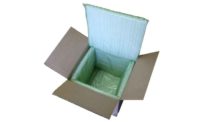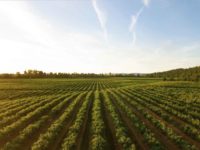R&D Strategies for Plant-Based Foods
How Nestle succeeds in this highly competitive cold foods category.

Nestlé acquired Sweet Earth in 2017, and made it the company’s U.S. plant-based brand. Garden Gourmet is Nestlé’s European plant-based brand.
In our July 2020 State of the Industry Report, we detailed the continued rise of refrigerated and frozen plant-based foods, which were ascending to record heights at the time due to pandemic purchasing by consumers. Plant-based retail sales were 90% over 2019 numbers by mid-April, according to the Plant-Based Food Association and SPINS.

From a January 2021 perspective, it’s likely more consumers than ever are aware of plant-based foods—no longer a niche category—and while many continue to buy meatless staples like veggie burgers, sausages, crumbles and more, they’re also seeking newer varieties, along with improved flavor profiles and updated better-for-you ingredients.

One company at the forefront of this category is Nestlé, and its Sweet Earth brand (which it acquired in 2017) in the States, along with its Garden Gourmet brand in Europe. On a recent From the Cold Corner Podcast, I sat down with Ryan Riddle, R&D specialist for plant-based meal solutions at Nestlé, where we discussed the innovation and consumer insight necessary to produce new plant-based products to satisfy consumer appetites and the need for novelty, which are crucial areas for processors looking to expand the category.

Sweet Earth’s POGOs (Power-On-The-Go) plantbased snack bars helped the brand kick off a busy 2020 when they launched last January.
Below is an excerpt from our conversation, which has been edited for clarity and brevity. To hear our entire 16 minute podcast, just click here. You can also subscribe to From the Cold Corner on your favorite podcast platform so you’ll never miss an episode.
R&FF: Why has demand for plant-based foods grown so much in recent years?
Riddle: I think over time, folks have become more and more health conscious and they’re seeing a plant-based diet as a way to make a significant improvement to their health. I also think folks are becoming more and more concerned about global climate change and just the sustainability impact of the foods they eat, particularly the effect that meat production has on contributing to global climate change. More and more folks are seeing switching to a plant-based diet as one of the most impactful things that you can do on a personal level to reduce your carbon footprint and slow the acceleration of climate change. I also think there’s other reasons, like animal welfare and religious reasons. Those all come together to this shift towards a more plant-based diet that we really feel is here to stay.


Sweet Earth debuted its plant-based Awesome Burger in 2019, and launched a vegan Awesome Bacon Burger in 2020.

R&FF: What are the basic R&D steps of developing a plant-based product for Nestlé, and what would your timeline be for a product to be approved?
Riddle: We’re looking at all timelines in terms of what can we do to revamp our current products and add new flavors. But also consider that Nestlé has been around for 150 years, and it’s with that perspective that we look ahead to the future of food. So we’re working with our global network of suppliers, and we’re working with dozens of scientists around the world and with Nestlé’s R&D network to develop new technologies and figure out how to incorporate those technologies into real products. It really all depends on the type of project—it could be a few months or a few years. We’re trying to look ahead and bring those innovations to consumers as fast as we can while still making sure we’re doing it in a way that’s sustainable, safe and delivers a good quality product every time.
R&FF: What are some new plant-based products you’ve been working on or that are in the pipeline for Nestlé in 2021?
Riddle: We’re really excited about new extensions to our frozen pizzas. We’ve got some great regular pizzas that have plant-based toppings on them, but also some that are 100% plant based with our cauliflower crusts. We’re working on burritos and bowls that incorporate our plant- based Awesome Grounds as a substitute to ground beef, and new flavors of our Mindful Chick’n.


Sweet Earth rolled out a line of plant-based sausages in 2020, including Chick’n Apple, Asian Ginger-Scallion, and Green Chile Chedd’r, made with vegan cheese.

R&FF: Is your R&D primarily about creating a facsimile of something that’s familiar to people, like a sausage, burger, or burrito? Or do you have a side of your R&D that’s for people who are already vegetarian or vegan?
Riddle: There’s a lot of folks who really enjoy the taste of meat, but whether it’s for health or sustainability reasons, they want to incorporate a plant-based diet into their routine a bit more often. For those types of people, we have meat substitutes like our Sweet Earth Awesome Burger, Sweet Earth Awesome Grounds, or Sweet Earth Sausage where we’re trying to make something that can be substituted for a typical base item. On the other side, there are vegetarian folks that maybe don’t even like the taste of meat, or maybe they just don’t need meat in a product for it to feel like a meal. And so, we’re working on meat substitutes, but also working on products that feature plant-based flavors that people enjoy.
R&FF: 2020 was a record year for frozen and refrigerated retail products because of the pandemic and people cooking at home. What were some of your top sellers?
Riddle: If you go back to our mid-year global report, our plant-based and vegetarian sectors grew by nearly 40%. We’re seeing things like our Sweet Earth Awesome Burger, our burritos, and our Mindful Chick’n really drive growth in that category. Ultimately, our goal is to make it easier for folks to eat the way that they want to eat, and it’s just that folks more and more want to eat plant based.
R&FF: Why do plant-based products need to be kept cold?
Riddle: Freezing and refrigeration are among the best methods for preserving foods without having a big impact on the way that they taste. Our Sweet Earth Awesome Burger, Awesome Grounds or our cook-from-raw sausages need to be refrigerated for the same reason a regular beef burger or meat-based sausage would need to be refrigerated or frozen because it hasn’t been cooked. It’s meant to transform as you cook it and develop those flavors, and hasn’t been dried or heavily salted to preserve it.
R&FF: Plant-based foods have a health halo around them and they conjure up sustainability in many consumer minds. How important is sustainable processing and packaging to the plant-based foods you develop?
Riddle: It’s really critical for our brand. One of the biggest reasons folks are shifting to a plant-based diet is for sustainability, and so it’s important holistically for our product to be a sustainable option. That’s why we’ve put a lot of focus into not only the product and the ingredients that go into it, but also the packaging material. We’ve committed by 2025 to make 100% of our packaging recyclable or reusable, and we work with all our suppliers around the world to make sure we’re harvesting and processing these ingredients and packaging materials and as sustainably as we can.
R&FF: How do you see the plant-based foods category evolving in 2021, and what role do consumer preferences play in the next generation of plant-based foods?
Riddle: I think the shift towards a more plant-based diet is really here to stay. And again, there’s folks who love the taste of meat, and there’s folks who just love plant-based foods. I see a continual development of both of those areas, and new types of substitutes for meats and seafood that are completely plant-based coming in the future. Also, more and more varieties of interesting flavor combinations, highlighting vegetables as being the star ingredients.

Ryan Riddle is Senior R&D Specialist for Plant-Based Meal Solutions at Nestle.
R&FF: Was there anything you wanted to add or something I missed?
Riddle: There’s so much misconception out there about frozen and chilled products and how they’re over-processed, and I really have been trying to inform people that it’s quite the opposite, particularly with frozen food. Freezing is the best preservation method to lock in the flavor and the nutrients without impacting the texture, so I really value frozen and cold storage as a way to deliver the highest quality food products, and allow us to deliver a product like the Awesome Burger that hasn’t been cooked and completely transforms when you cook it. I’m very proud to be in the frozen food industry and work with ingredient and packaging suppliers and cold storage supply chain folks. It’s all part of a food system that is helping us bring the freshest possible products to consumers on a daily basis.
Looking for a reprint of this article?
From high-res PDFs to custom plaques, order your copy today!






